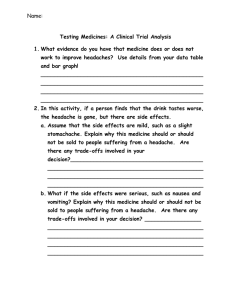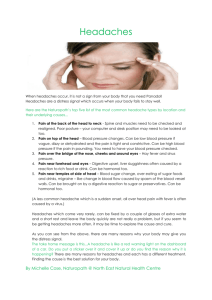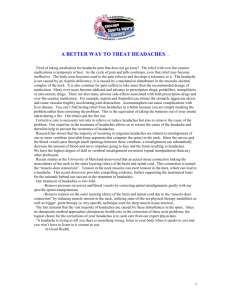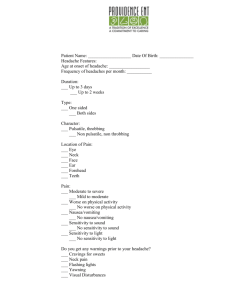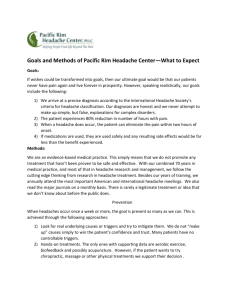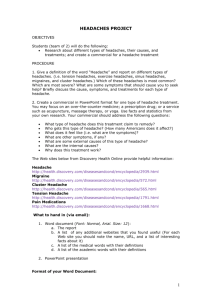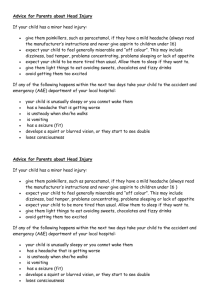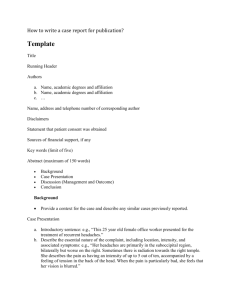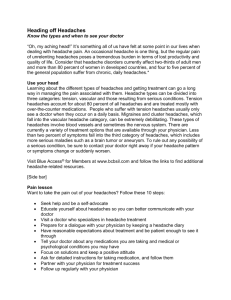Tension Headache - neurodata.co.uk
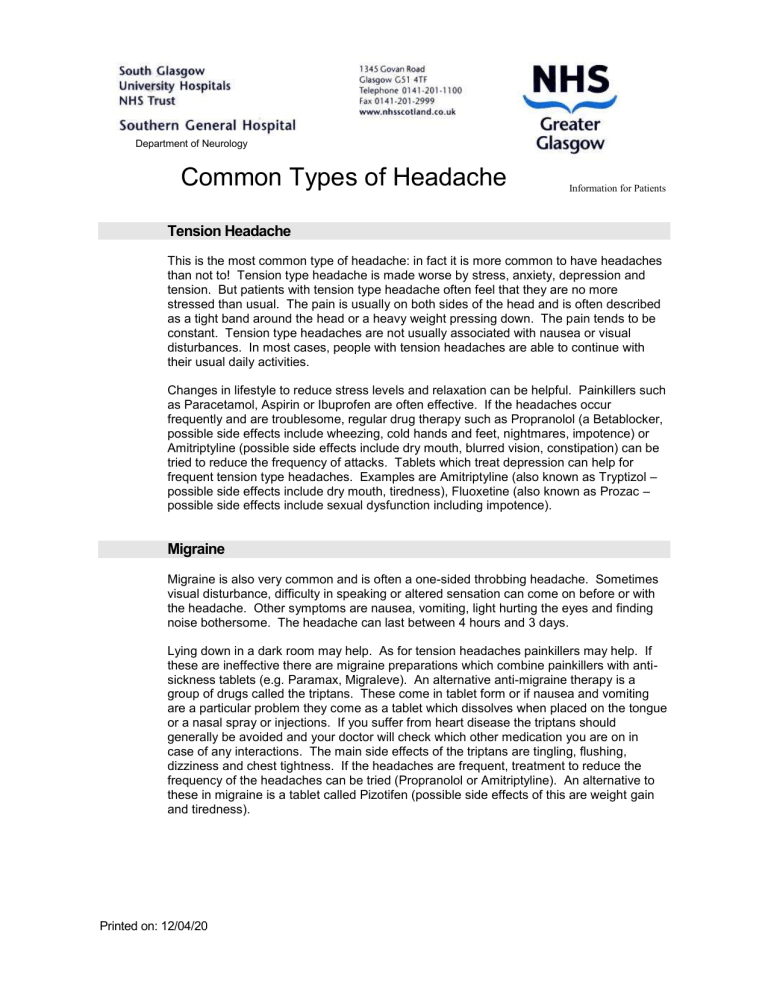
Department of Neurology .
.
.
.
.
.
.
.
.
.
.
.
.
.
.
.
.
.
.
.
.
.
.
.
.
.
.
.
.
.
.
.
.
.
.
.
Information for Patients
Tension Headache
This is the most common type of headache: in fact it is more common to have headaches than not to! Tension type headache is made worse by stress, anxiety, depression and tension. But patients with tension type headache often feel that they are no more stressed than usual. The pain is usually on both sides of the head and is often described as a tight band around the head or a heavy weight pressing down. The pain tends to be constant. Tension type headaches are not usually associated with nausea or visual disturbances. In most cases, people with tension headaches are able to continue with their usual daily activities.
Changes in lifestyle to reduce stress levels and relaxation can be helpful. Painkillers such as Paracetamol, Aspirin or Ibuprofen are often effective. If the headaches occur frequently and are troublesome, regular drug therapy such as Propranolol (a Betablocker, possible side effects include wheezing, cold hands and feet, nightmares, impotence) or
Amitriptyline (possible side effects include dry mouth, blurred vision, constipation) can be tried to reduce the frequency of attacks. Tablets which treat depression can help for frequent tension type headaches. Examples are Amitriptyline (also known as Tryptizol – possible side effects include dry mouth, tiredness), Fluoxetine (also known as Prozac – possible side effects include sexual dysfunction including impotence).
Migraine
Migraine is also very common and is often a one-sided throbbing headache. Sometimes visual disturbance, difficulty in speaking or altered sensation can come on before or with the headache. Other symptoms are nausea, vomiting, light hurting the eyes and finding noise bothersome. The headache can last between 4 hours and 3 days.
Lying down in a dark room may help. As for tension headaches painkillers may help. If these are ineffective there are migraine preparations which combine painkillers with antisickness tablets (e.g. Paramax, Migraleve). An alternative anti-migraine therapy is a group of drugs called the triptans. These come in tablet form or if nausea and vomiting are a particular problem they come as a tablet which dissolves when placed on the tongue or a nasal spray or injections. If you suffer from heart disease the triptans should generally be avoided and your doctor will check which other medication you are on in case of any interactions. The main side effects of the triptans are tingling, flushing, dizziness and chest tightness. If the headaches are frequent, treatment to reduce the frequency of the headaches can be tried (Propranolol or Amitriptyline). An alternative to these in migraine is a tablet called Pizotifen (possible side effects of this are weight gain and tiredness).
Printed on: 12/04/20
Chronic Daily Headache
People with chronic daily headache have usually suffered from headaches for years. The headache occurs every day, often lasting all day long. The pain is often a dull ache. This type of headache is associated with regular use of painkillers, particularly painkillers containing codeine. The problem is that the painkillers initially taken to relieve the headache are now contributing to the headaches and actually causing headaches.
The treatment of this sort of headache is to reduce the amount of painkillers taken, with an aim to stop taking painkillers on a regular basis. Painkillers may have to be taken for the worst headache attacks, but then reduced again to prevent “withdrawal” or “rebound” headaches. Taking tablets to reduce the frequency of headaches (e.g. Propranolol,
Amitriptyline or Fluoxetine) will help achieve this. (See tension type headache for more information about these treatments).
Headaches Associated with Neck Arthritis
People with wear-and-tear arthritis in their necks (also called osteoarthritis or cervical spondylosis) can suffer from headaches. The pain is sometimes worse on moving the neck and often starts in the back of the neck and spreads up the back of the head.
Sometimes the nerv es to the back of the head are “trapped” or “nipped” in the neck area, causing a numbness, tingling or unpleasant sensation in the scalp.
Anti-inflammatory drugs for example Ibuprofen (also known as Brufen) often help this type of headache. The main side effect of the anti-inflammatory is heartburn or indigestion and if you suffer from stomach trouble such as an ulcer, you should avoid the antiinflammatory drugs.
Physiotherapy is sometimes helpful for neck arthritis. But many patients find that their neck or headache pain is worse after neck movements during these sort of exercises.
Wearing a cervical collar can help take the pressure off the neck, but most patients find that wearing a collar all the time (all day and all night) is uncomfortable and it is most useful when travelling or sitting relaxing such as watching TV in the evening. It is important to make sure the neck is not put under strain, when headaches are triggered by neck arthritis. For example, lifting heavy shopping, moving furniture, working above you
(cupboards, cleaning windows, changing curtains) or at an awkward angle (watching TV, working at a computer screen) should all be avoided. The neck should be well supported in bed at night by firm pillows.
Pregnancy and Contraception Issues
If you think you may be pregnant or are planning a pregnancy, it is better not to take medicines, but if a painkiller is required Paracetamol is safe to take during pregnancy.
Headaches can be triggered or worsened by taking the contraceptive pill, if this is the case you should see your doctor.
